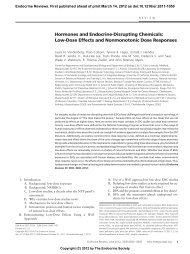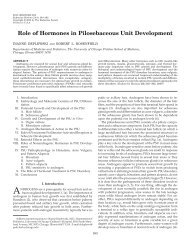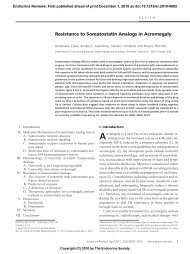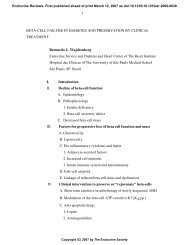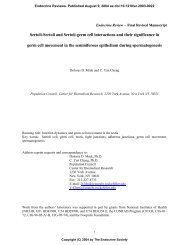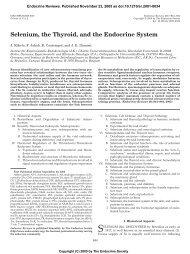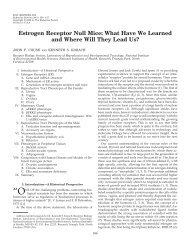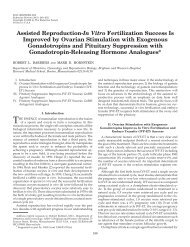You also want an ePaper? Increase the reach of your titles
YUMPU automatically turns print PDFs into web optimized ePapers that Google loves.
ate with anastrozole in the PgR-positive vs. PgR-negative subsets. The observation that<br />
patients with <strong>ER</strong>-positive/PgR-negative tumors respond nearly as well to the aromatase<br />
inhibitor as those with PgR-positive tumors suggests that the <strong>ER</strong> signaling pathway is<br />
functional in many <strong>ER</strong>-positive/PgR-negative tumors and that these tumors are still<br />
dependent on estrogen for growth despite somewhat lower <strong>ER</strong> levels. Importantly<br />
however, a recently updated conference report of this trial, analyzing the differential<br />
response of PgR-negative tumors to AIs vs. tamoxifen, only in specimens with centrally<br />
reviewed steroid receptor expression, failed to confirm the selective benefit of AIs vs.<br />
tamoxifen in this group of tumors. Worse outcome was, nonetheless, demonstrated in<br />
patients with PgR-negative tumors, regardless of the endocrine therapy used (145). A<br />
similar interaction between PgR-negative status and endocrine resistance in the adjuvant<br />
tamoxifen setting was also found in a recent study in an independent group of patients<br />
(112). Finally, a report from the BIG 1-98 trial which compared letrozole and tamoxifen<br />
with sequences of each agent, while confirming the finding that patients with PgR-<br />
negative tumors have a worse clinical outcome, failed to demonstrate an effect of PgR<br />
expression on the relative efficacy of letrozole over tamoxifen (114). Whether PgR<br />
negativity is a predictive factor for poor clinical outcome on endocrine therapy or a<br />
prognostic factor, as recently suggested by RT-PCR-based assays (146), remains<br />
controversial and needs to be further investigated.<br />
A recent retrospective analysis from Arpino et al., considered a large number of patients<br />
with tumor receptor assays all performed centrally by standardized techniques; this work<br />
provides clues to the origin of the distinct <strong>ER</strong>-positive/PgR-negative phenotype (147).<br />
24



